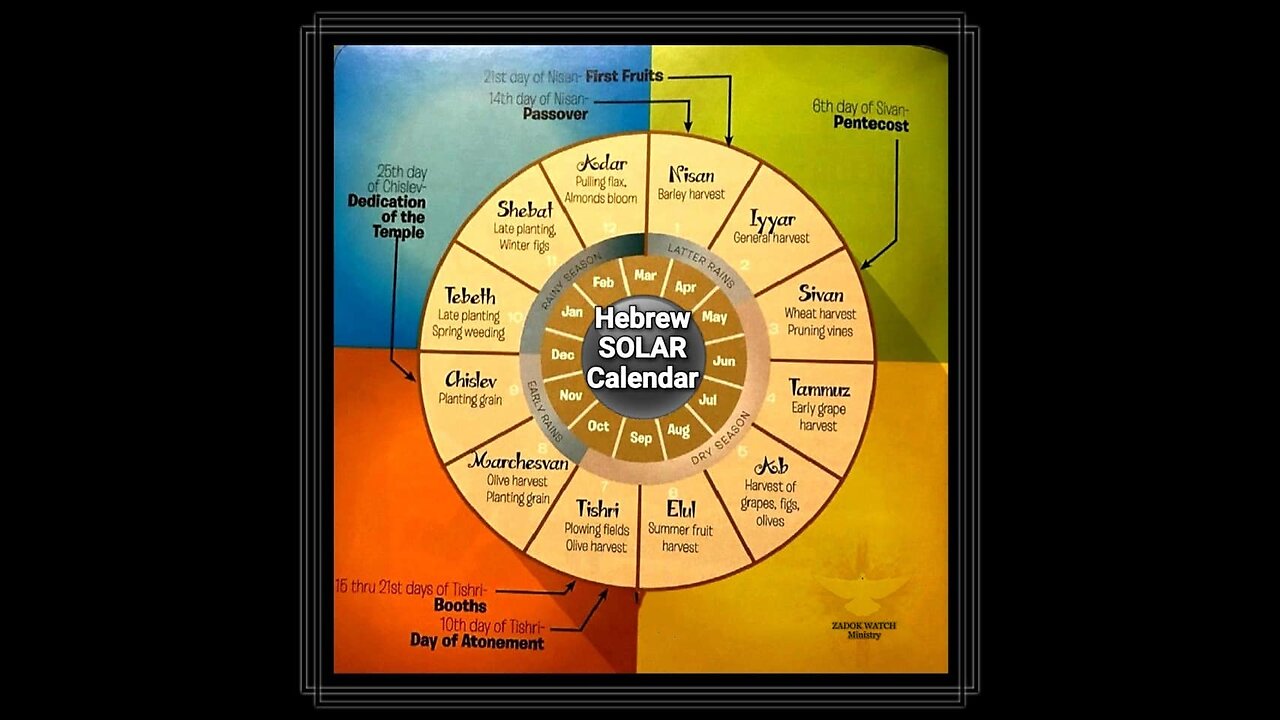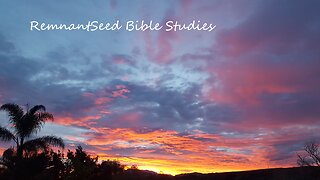Premium Only Content

The Father of Time
The Father of Time
Hyper-dispensation
How is it possible for YHVH to be omniscient and omnipresent?
Because he is not bound by the constraints of time and space.
When you ponder the word “space” as it is understood in the English language, people think of outer space and the vast expanse of the universe. Looking at it from a fundamental point of view you could narrow it down to the space between two rooms in a house. Space is limited to the physical world and so is time.
Would if there was a world or dimension with no physical space or time? Have you ever wondered what there would be if there was “nothing”? The next question would be then, when did nothing become something? Keep in mind this only applies to the physical world. This is the conundrum that mankind will never be able to answer. When was God born? And from what? Where? The big bang theory can’t explain this on any level. Even creation doesn’t explain this, it just says “in the beginning” and God simply says “I AM”.
What we are left with is faith in God’s Word. Without faith it is impossible to please God. We will never understand what “nothing” really is but we can speculate. “Nothing” is where God exists, it is not physical and can’t be explained in physical terms. It is a dimension that exists outside of the physical world. This allows Him to be Omni-present and omniscient because He sees everything from outside time and space. There is no past, present or future in Gods world, only the “now”.
When theologians look at the word “dispensation” they only look at it from the perspective of the physical world. How do you actually start and stop the hands of time? Answer; you have to be outside of the physical world where time doesn’t pass. Before the beginning and after the end. This is true omniscience. Its mind boggling for the human brain to contemplate.
How many times sense the beginning of time has God started and stopped the hands of time? We know of two future dispensations of time and most theologians can agree they are the Millennium and then eternity and the now or present. If you really stop and think about it eternity is not a dispensation of time it is a dispensation where time doesn’t pass when we enter God’s world.
If you rightly divide the Word of God you will notice that Revelation 12 speaks of a previous dispensation of time and a dividing line between this age and the past age. It’s called the great Kataballo or the overthrow of satan. YHVH stopped the hands of time for how long we don’t know and then started the clock back up again.
Many theologians fail to understand this great dividing line of time in their theology, therefore darkening their understanding of who the Father of time is. They can agree on future dispensations of time but completely overlook past dispensations of time and their understanding is very limited because of it.
If the Father can create the universe, He is surely able to start and stop the hands of time at His will. One of the clues to the ancient nature of our souls is the word “Everlasting”. It looks forward to eternity but it also looks backward to eternity.
When interpreting the Bible you must understand the difference between a space of time or era within this dispensation and the difference between a complete reset. For instance, the flood of Noah was not a complete reset. The Kataballo or overthrow of satan was a complete reset. Our reality went from celestial to terrestrial or spiritual to carnal and time was stopped and then started back up again.
We were in the perfect plan of God in His original purpose and now we are within the Counsels of God in His secondary plan for his children. It is the age of redemption and grace. When this age ends we will go back to the original perfect plan of God for eternity.
World G # 2889 kosmos: order, the world Original Word: κόσμος, ου, ὁ
Part of Speech: Noun, Masculine Transliteration: kosmos
Phonetic Spelling: (kos'-mos) Definition: order, the world
Usage: the world, universe; worldly affairs; the inhabitants of the world; adornment. adorning, world. Probably from the base of komizo; orderly arrangement, i.e. Decoration; by implication, the world (in a wide or narrow sense, including its inhabitants, literally or figuratively (morally)) -- adorning, world. see GREEK komizo
G # 2865 komizó: to bear, carry Original Word: κομίζω
Part of Speech: Verb Transliteration: komizó
Phonetic Spelling: (kom-id'-zo) Definition: to bear, carry
Usage: (a) act: I convey, bring, carry, (b) mid: I receive back, receive what has belonged to myself but has been lost, or else promised but kept back, or: I get what has come to be my own by earning, recover.
G # 2886 kosmikos: pertaining to the world Original Word: κοσμικός, ή, όν Part of Speech: Adjective Transliteration: kosmikos
Phonetic Spelling: (kos-mee-kos') Definition: pertaining to the world
Usage: earthly, worldly (belonging to the present earthly world as opposed to the heavenly and future).
G # 165 aión: a space of time, an age Original Word: αἰών, ῶνος, ὁ
Part of Speech: Noun, Masculine Transliteration: aión
Phonetic Spelling: (ahee-ohn') Definition: a space of time, an age
Usage: an age, a cycle (of time), especially of the present age as contrasted with the future age, and of one of a series of ages stretching to infinity.
G # 4930 sunteleia: a joint payment (for public service), joint action, spec. completion Original Word: συντέλεια, ας, ἡ Part of Speech: Noun, Feminine Transliteration: sunteleia Phonetic Spelling: (soon-tel'-i-ah)
Definition: a joint payment (for public service), joint action, completion
Usage: a completion, consummation, end.
Let’s look at the word “Foundation”; katabole is also translated to the word “world”
Strong’s Concordance Greek # 2602 “Foundation” katabolé: a laying down Original Word: καταβολή, ῆς, ἡPart of Speech: Noun, Feminine Transliteration: katabolé Phonetic Spelling: (kat-ab-ol-ay')Definition: a laying down Usage: (a) foundation, (b) depositing, sowing, deposit, technically used of the act of conception.
Greek #2598 “Foundation” kataballó: to cast down Original Word: καταβάλλωPart of Speech: Verb Transliteration: kataballó Phonetic Spelling: (kat-ab-al'-lo) Definition: to cast down Usage: (a) mid: I lay, of a foundation, (b) met: I cast down, prostrate. cast down, lay. From kata and ballo; to throw down -- cast down, lay. see GREEK kata see GREEK ballo
Greek prime # 2532 kai: and, even, also Original Word: καί Part of Speech: Conjunction Transliteration: kai Phonetic Spelling: (kahee) Definition: and, even, also Usage: and, even, also, namely. and, also, both, but, even, for, if, or, so Apparently, a primary particle, having a copulative and sometimes also a cumulative force; and, also, even, so then, too, etc.; often used in connection (or composition) with other particles or small words -- and, also, both, but, even, for, if, or, so, that, then, therefore, when, yet.
Strong’s Hebrew # 3245 “Foundation” yasad: to establish, found, fix Original Word: יָסַד Part of Speech: Verb Transliteration: yasad Phonetic Spelling: (yaw-sad') Definition: to establish, found, fix appoint, take counsel, establish, lay the, lay for a foundation, instruct, lay, ordain, A primitive root; to set (literally or figuratively); intensively, to found; reflexively, to sit down together, i.e. Settle, consult -- appoint, take counsel, establish, (lay the, lay for a) found(-ation), instruct, lay, ordain, set, X sure.
My Books on Amazon
Bible Questions Answered
Paperback
https://www.amazon.com/dp/B0CFZ8BJ4K
Ecopy
https://www.amazon.com/dp/B0CFXB19SS
Defending the faith
https://www.amazon.ca/dp/B085RHWD7P
Last Generation
https://www.amazon.ca/dp/B0834P78ZV
The Rain Appendixes to the Companion Bible
https://www.therain.org/appendixes/
-
 33:40
33:40
RemnantSeed
1 year agoHaving a form of godliness but denying the power thereof
414 -
 34:42
34:42
The Rubin Report
1 hour agoGutfeld! Crowd Roars at Dave Rubin’s Reaction to Signal Chat Scandal
7.67K3 -
 1:01:23
1:01:23
VINCE
3 hours agoWhite House Correspondent Reagan Reese Joins The Show - 03/28/25
172K165 -
 UPCOMING
UPCOMING
Film Threat
1 hour agoDISNEY PARODY SCREAMBOAT + A WORKING MAN + LOADS OF REVIEWS | Film Threat Livecast
115 -
 LIVE
LIVE
LFA TV
15 hours agoALL HANDS ON DECK! | LIVE FROM AMERICA 3.28.25 11AM
3,402 watching -
 LIVE
LIVE
Tudor Dixon
2 hours agoThe Birth of the March Madness Bracket | The Tudor Dixon Podcast
27 watching -
 42:50
42:50
Tate Speech by Andrew Tate
1 hour agoPETER PAN PEANUT BUTTER ALERT | WHITE POWER
25.8K23 -
 LIVE
LIVE
Caleb Hammer
1 hour agoIf Her Husband Sees This, He's Leaving | Financial Audit
141 watching -
 LIVE
LIVE
The Big Mig™
3 hours agoMichigan White Democrats Want New Jim Crow Laws?
4,626 watching -
 1:02:10
1:02:10
BonginoReport
5 hours agoLeft Loses it Over a Cartoon - Early Edition With Evita (Ep.170) - 03/28/2025
134K179